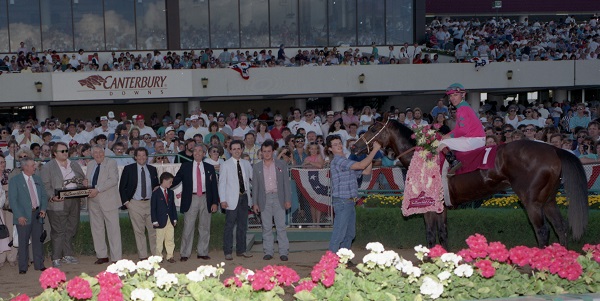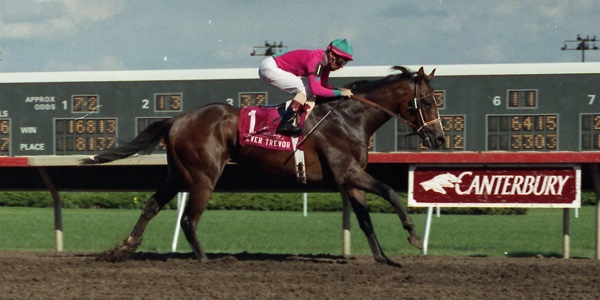BY JIM WELLS
The news arrived as if it had been delivered by carrier pigeon, from a window sill in the past to a ledge in the present, connecting a part of Canterbury history to the summer of 2016. A message winging its way across time:
Clever Trevor is dead.
The name stirred up memories of the richest race in track history, the St. Paul Derby, which paid $315,000 that Sunday afternoon in 1989 and attracted horses and well-known riders from across the nation.
The headline in the St. Paul Pioneer Press the next day read, simply, “Clever Trevor smokes derby foes.”
From gate to wire, by a widening seven lengths.
His was a name that conjured up a sense of affection, in fans and his young namesake, 10-year-old Trevor McNeil, whose father, Don, and mother, Cheri, owned and bred the horse at their Oklahoma ranch.
Young Trevor was troubled before the race after his beloved horse drew the inside post, just as he had in the Kentucky Derby a few weeks earlier, when he stopped badly on the last turn in a race won by Sunday Silence.
Yet, he was a solid horse with speed and stamina, had won the Remington Park Derby, would later win the Grade I Arlington Classic. In perhaps the greatest race of his career, the Travers Stakes, he ran a strong second to Easy Goer and led much of the way. The gelded son of Slewacide and Little Mary Beans retired at age six, having won 15 of his 30 career starts with earnings of $1.3 million.
Dave Miller, the current Equibase chart caller in Shakopee, was at Canterbury Downs for the fourth running of the St. Paul Derby that day and recalls the race and specific characteristics of the winner.
“He had such a clean action, was the kind of racehorse everybody wants,” Miller said. “He could be rated but he had so much natural speed that many times he found himself on the lead. He had such efficiency of action and a good mind.”
As support for his statement, Miller recalled a picture of the horse in which all
four feet are off the ground, as if he’s gliding on air.
“It’s a picture used all the time,” he said. “What a glib horse he was, such a clean mover, like speed guys in the NFL, like a Lynn Swann. He looked like a gazelle.”
Donnie Von Hemel said Clevor Trevor is among the top five, and can be argued as No. 1, among horses he’s trained during his career. The McNeils had kept Clever Trevor at Von Hemel’s farm since the horse retired. Don’s wife, Robin, and daughter, Tess, were devoted to the horse, particularly as he aged and needed additional attention.
On Saturday, at age 30, 24 years after retirement, it became necessary to put him down. He was no longer able to regain his feet .
There is a hole that won’t soon be filled at the Von Hemel farm or with the McNeil family. Over the years, McNeil grandchildren and others would visit the old fellow.
“My daughter is 17 now,” Von Hemel added, “and she doesn’t remember life without him.”
Tess and Robin performed like medical aides to the horse as he aged, keeping him on schedule and interested in life via treats and other attention.
Certainly the decision to euthanize the beloved racehorse took a toll on the two women, but they were not alone. “I can hardly talk about it without choking up,” said Clever’s trainer.
Don Von Hemel was 27 years old when he brought Clever Trevor to Canterbury for the Derby that June afternoon in 1989. The race included $100,000 in bonus money for a Grade I winner who also won the derby. Music Merci was a Grade I winner who collected an extra $15,000 for a third place finish.
Here is one account of that race:
“There is a simple explanation for what happened in the St. Paul Derby on Sunday at Canterbury Downs.”
“Clever Trevor by a Scott County mile.”
“He was the first horse to leave the paddock, the first horse in the gate and the first horse at the wire. _ by seven widening lengths in a wire-to-wire performance.
“He did it so easily that jockey Don Pettinger didn’t once go to his whip.”
With six horses behind him, Pettinger brought his horse in under a hand ride.
The derby attracted the largest crowd of the season to that date in 1989: 15,863, and the second largest handle of the year: $1,801,972.
The race itself was the first simulcast from Canterbury to other sites in the country and attracted wagering of $469,613. Remington Park bettors, despite the horse’s Derby win there, made Clever Trevor a co-second choice with Western Playboy and Music Merci the 3-2 favorite. Canterbury patrons bet $319,854 on the derby and made Clever Trevor a third choice to Music Music Merci and Western Playboy.
Chris Antley rode Tricky Creek in the race, Gary Stevens was on Music Merci, Randy Romero rode Western Playboy, Alex Solis was aboard First Play, Scott Stevens was in the irons on Faultless Ensign and Dean Kutz rode Termez.
None of them could keep pace with the winner, who, on a surface listed as good, tied the track record at the time for a mile and 1/8, 1:48.
And earned a place in Canterbury history at the same time.

